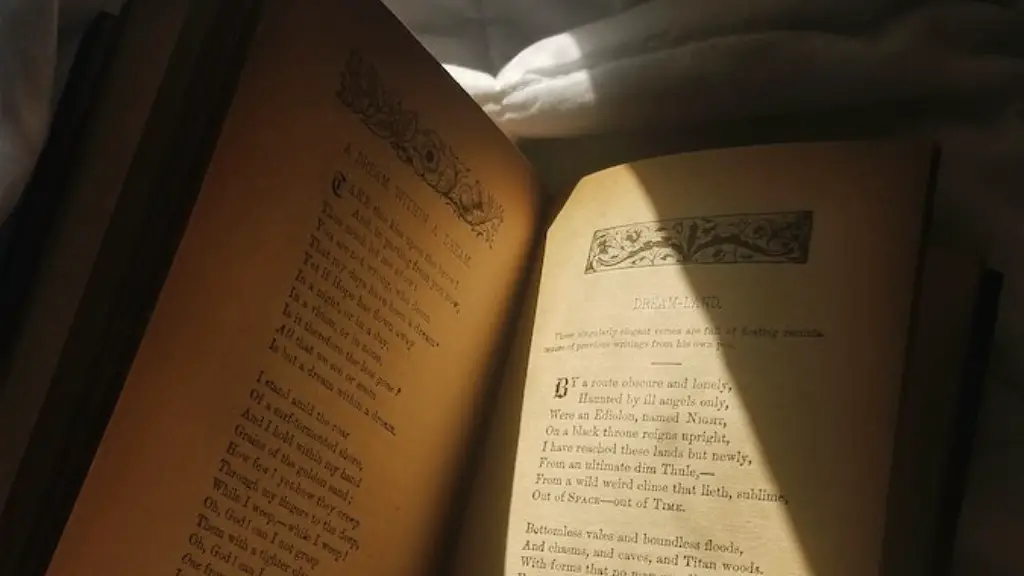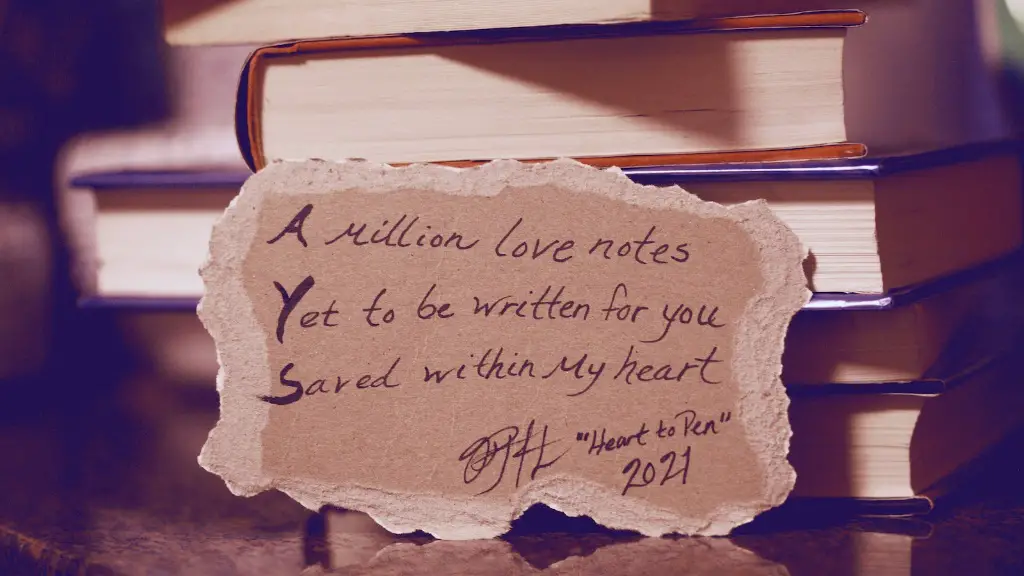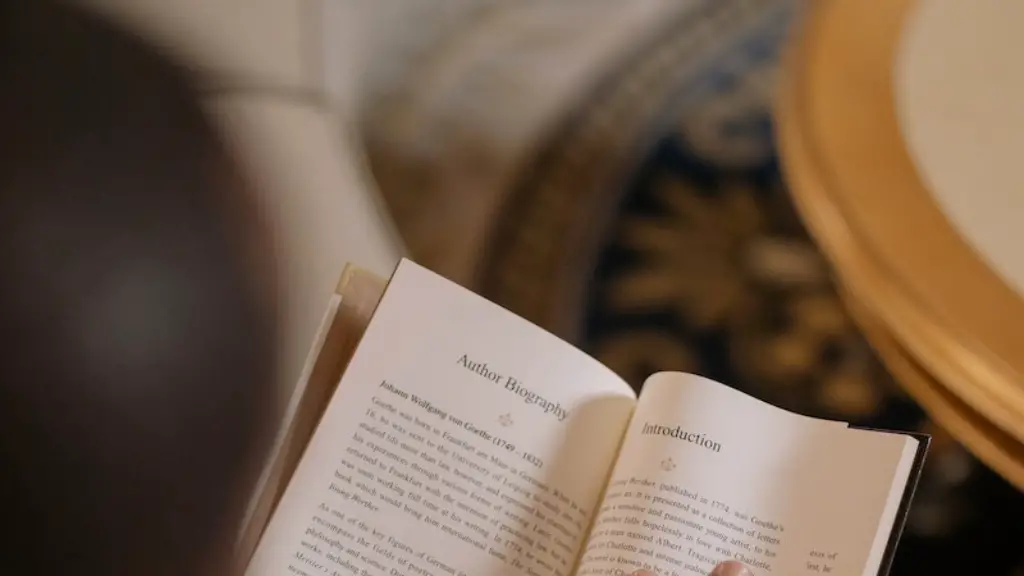Revolutionary poetry has been inspiring generations for centuries, but what is resistance poetry and how does it play a role in society today? Resistance poetry has its origins in political dissent, and today it is still used to raise awareness and to challenge authority. Resistance poetry is often described as the voice of the oppressed, and it is used to question the status quo and to be an advocate for the voiceless. Through its powerful words, it unites people in a common cause to push for change in the way society is structured and how injustices are handled. Resistance poetry contains themes of resistance against oppression and injustice, as well as a call for unified action.
The themes of resistance poetry focus on advocating for the marginalized and oppressed, while also drawing attention to the systems of oppression that are in place. These themes are often expressed through subtle messages and symbols, such as a call to action or a warning of consequences. It is believed that resistance poetry can be used to empower those whose voices have been silenced and propel them to take action against oppressive systems. Resistance poetry often draws on personal experiences to create powerful and engaging narratives that engage the reader and encourage them to think about the issues being addressed. In this way, resistance poetry can be used as a tool to bring about social and political change.
Resistance poetry has been used throughout history to bring attention to topics such as human rights, social injustice, and racial and gender inequality. For example, some of the most influential figures in literature were revolutionaries who used their poetry to speak out against their oppressive governments. These poetic works have become essential reading for many, as they provide an alternative voice and a different way of thinking about the world. In more recent times, resistance poetry has been used to bring attention to topics such as climate change, immigration, war, and poverty. Through its ability to draw attention to topics that are often overlooked or silenced, resistance poetry plays an important role in helping to create a more equal and just society.
Although resistance poetry has traditionally been an expression of opposition to oppressive systems, it has also been used in a more positive way to celebrate cultural identities and promote social justice. This is because it has the power to bring attention to minority voices, tell those voices stories, and fight to represent the marginalized and oppressed. Through its unique voice, resistance poetry can celebrate the culture of those who are underrepresented in society, inspiring them to stand up against oppressive systems and strive for positive change.
Modern resistance poets continue to use their words to fight for change and support for the voiceless. They draw attention to topics and stories that are often ignored in mainstream media and create vivid, powerful images of struggles, oppression, and resistance. Resistance poets are passionate activists that use their words to show the world what can be achieved if people come together to fight injustice.
Style of Resistance Poetry
People have used many different styles of poetry when it comes to their calls for revolution. Common styles include free-verse and spoken-style poetry, which allow for emotional expression, as well as structured verse which highlights the poet’s message. More modern styles such as hip-hop and rap have become increasingly popular as a way to express resistance and solidarity against oppressive systems and authority.
As resistance poetry becomes more popular, more poets come forward to create pieces that are designed to challenge the status quo and push for change. Themes such as gender equality, environmental justice, racial equality, and other social injustices are explored with powerful words and vivid imagery, evoking emotion and inspiring action.
These styles of expression are becoming more widespread and accepted, as they are deemed an effective way to bring attention to issues that are often overlooked. Resistance poetry speaks to those who have historically been silenced by oppressive systems, and provides a platform for them to express their stories and experiences.
Impact of Resistance Poetry
Throughout its history, resistance poetry has had a powerful impact on society, raising awareness and providing a platform for those who have been silenced. In today’s world, it continues to make an impact, as people come together to fight for social justice and to challenge oppressive systems.
Resistance poets are seen as a strong voice in the fight for change, as their work can evoke emotion and raise awareness about different issues. Their work is often seen as a form of dissent and is used to bring attention to topics that are overlooked in mainstream media. Resistance poems inspire people to think about the world and how it is structured, and how everyone has a role to play in creating a better future.
Resistance poetry has a powerful ability to bring people together and inspire unified action. It can help shape the narrative around a subject, making it easier for people to understand when it comes to activism and initiatives to change the world. Thus, resistance poetry plays an important role in society, as it encourages people to think beyond the status quo and challenge the oppressive systems that are in place.
The Future of Resistance Poetry
The future of resistance poetry looks bright, as more and more people come forward to use their words to challenge oppressive systems and create positive change. This form of expression has a unique power to evoke emotion and bring attention to topics that are often overlooked. As more and more people become aware of the impact of resistance poetry, it will continue to become an even more powerful form of expression. People of all ages, cultures and backgrounds are being empowered to use their words to fight for a fairer and more just world.
Resistance poetry has a powerful impact on the people who read it, as well as the people who create it. By providing an outlet to express their stories, experiences and struggles, it allows people to be seen and heard in a way that they may not have been before. As more people come forward to embrace this form of expression, we will see an even greater impact on society.
Challenges of Resistance Poetry
Although resistance poetry has had a long history of bringing about positive change, there are still some challenges that need to be addressed. One of the common challenges is the difficulty of making sure that the issues are seen and heard in mainstream media. As resistance poetry is often written and performed by individuals, it can be difficult for their message to reach an audience that is larger than their immediate community. As a result, resistance poetry may not have the same reach and impact as it could have if it had more support and a larger platform.
Another common challenge is that of backlash and censorship. Resistance poetry can often be seen as a threat to oppressive systems, and governments may attempt to undermine its power by censoring or suppressing it. As a result, people who create resistance poetry may face censorship and other forms of resistance to their work.
Despite the challenges that resistance poetry may face, its importance in the fight for social justice and a fairer, more equitable world cannot be overstated. As long as people continue to use their words to fight for change and raise awareness about social issues, resistance poetry will continue to be a powerful tool for positive change.
Applications of Resistance Poetry
Resistance poetry has a wide range of applications and can be used in a variety of ways. It can be used to raise awareness about a particular issue or to create a sense of solidarity among marginalized groups. It can also be used to educate people about various social issues and to spark conversations about how to create a more equitable and just world.
Resistance poetry can also be used in a more direct way, as a tool for mobilizing people to take action. Poets often use their work to call for unified action and to provide an outlet for people to express their dissent and push for change. By speaking out and raising awareness about an issue, resistance poets can inspire people to come together and fight for a better world.
Resistance poetry has an important role to play in creating a more equal and just world, and its use will continue to be important for years to come. The power of the words and their ability to evoke emotion and bring attention to important issues should not be underestimated. As long as people come forward to share their stories and fight for a better future, resistance poetry will remain a powerful tool for positive change.
Responsibility of Resistance Poets
The responsibility of resistance poets is an important one, as they have an important role to play in pushing for change and creating a fairer and more equitable world. As they are often seen as a voice of dissent and as a way to challenge oppressive systems, they have an obligation to use their power responsibly.
Resistance poets should strive to use their words with respect, never targeting individuals or groups unfairly. They must also take care to ensure that their words are not used to incite violence or hatred, as this would go against the principles of justice and equality that their words are designed to support.
Resistance poets should also strive to ensure that their words are heard by as many people as possible. By doing this, they can create a sense of solidarity and shared understanding among those who are marginalised and oppressed. This can be done through promoting their work on social media and other platforms.
Resistance poetry is an important form of expression and can be used as a powerful tool for positive change. Through its words, it can bring attention to often overlooked topics and fight for a better world. Resistance poets have an important role to play in this fight and have a responsibility to use their words with respect and consideration.
Creating a Legacy of Resistance Poetry
Resistance poets have an important role to play in creating a more equal and just world, and they can use their words to create a lasting legacy. They can use their work to ensure that the stories of those who are marginalised or oppressed are heard, and to make sure that the issues they face are not forgotten.
Resistance poets can also use their words to create a sense of empowerment for those who feel voiceless or overlooked. By telling stories of struggle, pain, and resilience, they can provide a platform for these voices to be heard and for inspiring change to take place.
Finally, resistance poets can use their work to raise awareness about social justice issues and to create a positive vision of the future. They can use their words to inspire people to come together and fight for a better world and to hope for a brighter tomorrow. By doing so, they can create a legacy of resistance poetry that will continue to have a profound impact on society for years to come.





